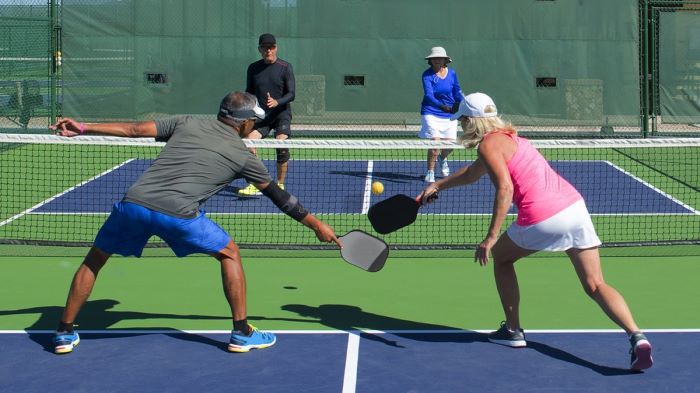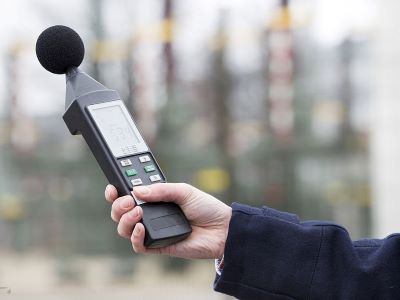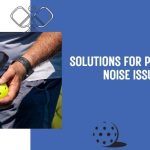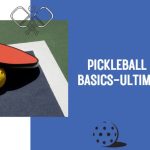If you are a fan of racket sports, you might have heard of pickleball and tennis. Both are fun and exciting games that people of all ages and skill levels can enjoy. But have you ever wondered how noisy they are? And why is pickleball louder than tennis?

In this article, we will answer these questions and explain the differences between pickleball and tennis noise (Pickleball Noise vs Tennis Noise). We will also look at some of the efforts to reduce noise levels and best practices for playing pickleball responsibly.
Decibel Levels of Pickleball and Tennis
Before we compare the noise levels of pickleball and tennis (Pickleball Noise vs Tennis Noise), let’s first understand what decibels are and how they are measured.
Decibels (dB) are units of sound pressure that indicate how loud a sound is. The sound gets louder as the decibel level increases. For example, a whisper is about 30 dB, a normal conversation is about 60 dB, and a jet engine is about 140 dB.
To measure the decibel levels of pickleball and tennis, we need a sound level meter that captures the sound waves and converts them into numerical values.
According to a sound level meter, pickleball can produce up to 55 dB of noise, below the EPA’s maximum average outdoor noise level of 55 dB. In comparison, tennis has around 45 dB of noise. It means that pickleball is about 10 dB louder than tennis, a significant difference in human perception.

3 Reasons Why Pickleball Is Louder Than Tennis
So why is pickleball louder than tennis? Several factors contribute to this difference, such as the equipment used, the size of the court, and the number of players involved.
1. Equipment
One of the main reasons why pickleball is louder than tennis is the equipment used in each sport. Pickleball uses a hard plastic ball and a paddle made of wood or composite with a solid face. When the ball hits the paddle, it creates a loud, high-pitched sound that can be heard from far away.
Tennis uses a soft rubber ball and a racket made of strings with a hollow frame. When the ball hits the strings, it creates a quieter, lower-pitched, less noticeable sound.
2. Court Size
Another reason pickleball is louder than tennis is the size of the court. Pickleball courts are smaller than tennis courts, measuring 20 feet by 44 feet for doubles and singles. Tennis courts are larger, measuring 27 feet by 78 feet for singles and 36 feet by 78 feet for doubles.
The smaller pickleball court means that players are closer to each other and the spectators, which can amplify the noise levels. The larger size of the tennis court means that players are farther apart and have more space to absorb the sound waves.
3. Number of Players
A third reason pickleball is louder than tennis is the number of players involved. Pickleball is usually played in doubles, meaning four players are on the court at a time. Tennis can be played in singles or doubles, but singles are more common at recreational levels.
More players on the court mean more balls hitting paddles, more voices communicating with teammates or opponents, and more movement and activity on the court. All these factors can increase the noise levels in pickleball compared to tennis.
Efforts to Reduce Noise Levels and Best Practices
Pickleball noise can be problematic for residents living near pickleball courts or facilities. Some people may find the noise annoying or disturbing, especially when trying to sleep or relax. Some people may even file complaints or legal actions against pickleball players or facilities for violating noise ordinances or creating a nuisance.

To address this issue, there are some efforts to reduce noise levels and best practices for playing pickleball responsibly. Some of these include:
- Using Quieter Balls and Paddles: Some balls and paddles are designed to produce less noise than others. For example, softer balls or paddles with foam cores can reduce the impact sound when hitting the ball. Players can choose these types of equipment to lower their noise levels.
- Installing Sound Barriers or Buffers: Some facilities can install sound barriers or buffers around their courts to block or absorb some noise from escaping. For example, fences, walls, hedges, trees, or acoustic panels can help reduce noise levels by up to 10 dB. Facilities can also choose locations away from residential areas or sensitive receptors.
- Limiting Playing Hours: Some facilities can limit their playing hours to avoid disturbing residents during quiet times, such as early mornings or late nights. For example, some facilities may have rules prohibiting playing before 8 a.m. or after 10 p.m. Players can respect these rules and follow the local noise ordinances.
- Choosing Appropriate Locations for Courts: Some players can play at locations less likely to cause noise problems, such as public parks, schools, or community centers. These locations may have more space, distance from neighbors, or more tolerance for noise. Players can also avoid playing at locations close to hospitals, nursing homes, or libraries.
FAQs
There is no such thing as a quiet pickleball, but some balls are more modest than others. For example, softer balls with larger holes can produce less noise than harder balls or balls with smaller holes.
You do not need to wear earplugs when playing pickleball unless you have a medical condition or a personal preference. The noise level of pickleball is below the EPA’s maximum average outdoor noise level of 55 dB and is safe for human hearing.
The factors affecting noise levels in sports include the type of equipment used, the size of the playing area, and the number of players involved. For example, hard materials, smaller courts, and more players can increase the noise levels in sports.
Well, Let’s Wrap Up!
Pickleball and tennis are great sports that provide many benefits. However, they also have different noise levels affecting players and the surrounding community.
Pickleball is louder than tennis due to its high-pitched sound when the ball hits the paddle. Smaller courts and pickleball noise can bother residents living near courts or facilities. However, there are ways to reduce noise levels and play pickleball responsibly.
We hope you enjoyed this article and learned something new about pickleball and tennis noise. If you have questions or comments, share them below. And if you want more information about pickleball or tennis, check out our other articles on this website. Thanks for reading, and happy playing!

I am a professional physiotherapist and the author of the BallSportsPro. I worked with athletes of all levels, from amateur to professional, and i helped them overcome injuries and improve their performance. I am a certified Pickleball instructor and has been playing the sport for over 10 years.




